Goldendoodle Separation Anxiety (6 Strategies and Advice)
How much do you love your Goldendoodle? It’s probably a lot—maybe even more than you can describe. But the incredible thing about this breed is that no matter how much you love them, it’s almost definite that they love you more.
Your sweet, affectionate Goldendoodle might love you so much that they wish to spend every second with you. But with a busy schedule that can include running errands, going to work, and taking care of a family, that’s just not possible.
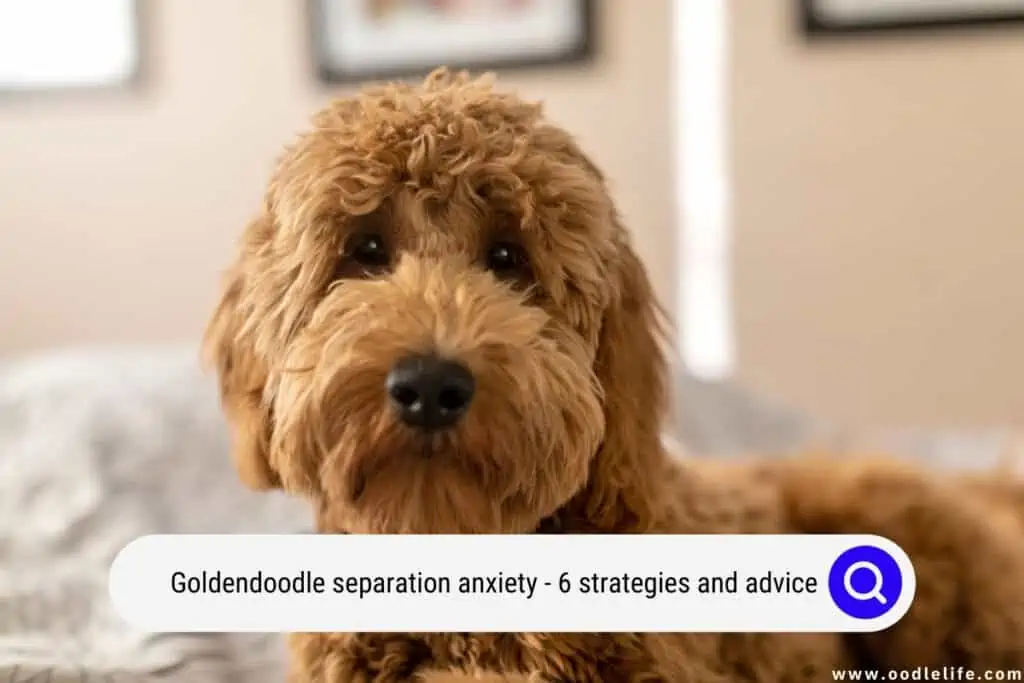
And when you leave, your Doodle may even experience separation anxiety. Goldendoodle separation anxiety is common, although not every dog owner knows how to deal with it. We have six tips to help soothe this anxiety and bring peace to you and your pup.
What Is Separation Anxiety?
Dog separation anxiety is marked by signs of extreme distress and agitation any time you leave your dog alone. From the time you leave the house to the moment you return, your dog becomes very anxious and stressed out, unsure of what to do without you around.
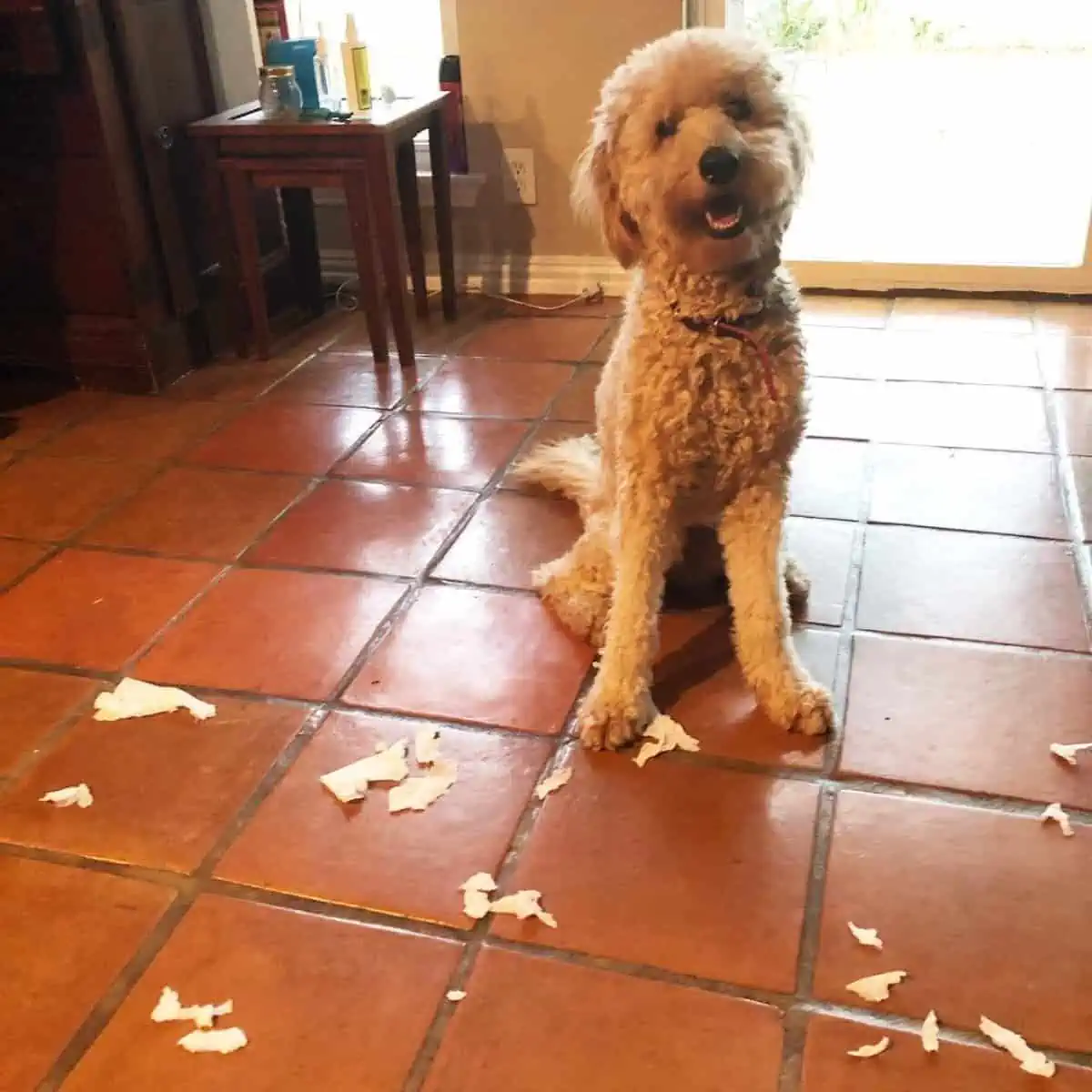
Separation anxiety can come with many symptoms that some pet owners may pass off as bad behavior. Some of these signs include:
- Trembling, whining, or pacing before/while you’re gone
- Excessive barking and howling
- Accidents in the house
- Chewing, digging, or scratching
- Drooling or panting
- Excessive attempts to escape
So, before you get angry at Fido for tearing up his bed or chewing up your couch cushion, consider that his behavior may be a sign of severe separation anxiety.
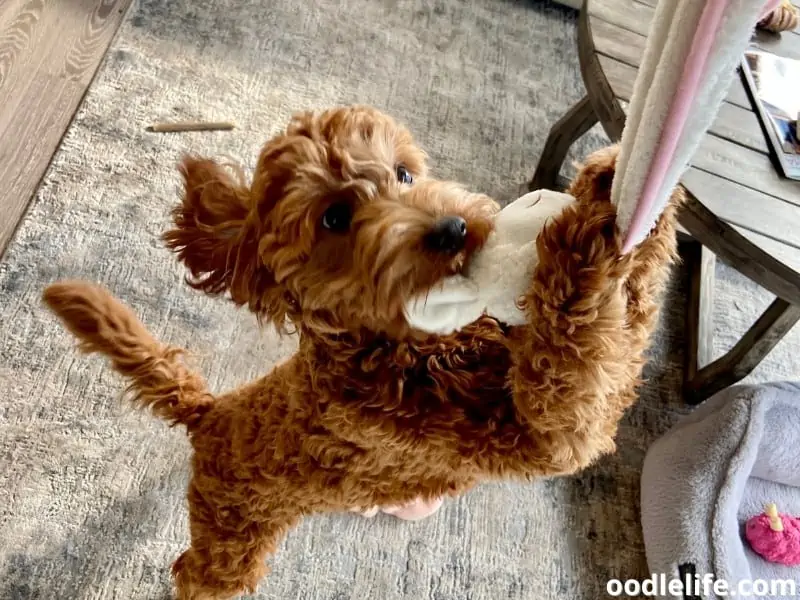
Why Does My Goldendoodle Have Separation Anxiety?
Goldendoodles are considered a designer breed. However, many Kennel Clubs do not formally recognize it because it is a mix of two purebreds (a Golden Retriever and a Poodle).
Goldendoodles are popular pets because of their fantastic temperaments. Doodles have the best of both parents.
Like Golden Retrievers, Goldendoodles are loyal, friendly, and social. Like Poodles, they are intelligent and affectionate.
But some of these same great traits can also make Goldendoodles more susceptible to separation anxiety. Because Goldendoodles love social settings, playtime, and lots of affection, they may swiftly develop anxiety when left alone.
Aside from personality traits, your Goldendoodle may also develop separation anxiety for other reasons:
- You haven’t established dominance.
- Lack of exercise and activity.
- You aren’t spending enough time with them.
- You make a big deal about leaving/returning to the house.
- You have a new puppy just separated from its mother.
- You baby your dog.
- There’s been a significant change in their lives.
Gaining a little bit of insight about why your Goldendoodle has separation anxiety can be helpful when you attempt to mitigate the issue.
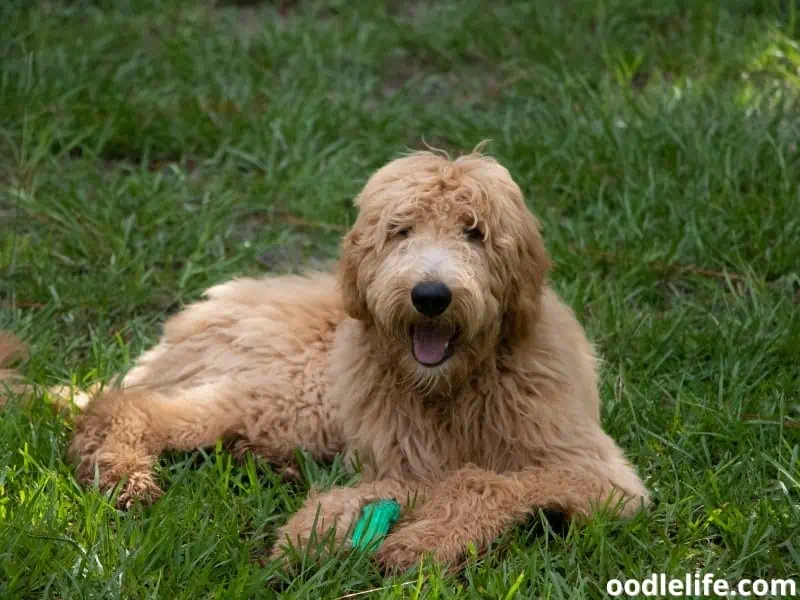
6 Tips & Strategies To Reduce Separation Anxiety
By this point, you’ve probably already identified that your Goldendoodle has separation anxiety. So whether little Fido pees on the floor every time you leave or spends the whole time ripping your shoes to pieces, you need a solution. Keep reading for six strategies and some advice.
1. Encourage Alone Time for Puppies
If your Goldendoodle is still a young puppy, you’re in luck. While puppies often cry when left alone, they’re still young enough to be trained to enjoy alone time.
One of the best ways to do this is to practice proper crate training. Never use a crate as a punishment. Instead, treat a puppy’s crate like a safe and happy place.
Fill it with soft blankets, its favorite toys, and treats.
You may let your dog roam free in the house alone after it’s potty trained, but its crate should remain open. Encourage your dog to enter whenever it pleases.
In addition to crate training for puppies, practice leaving them alone at this early stage. Close and open doors frequently, leave the room without announcing and leave it alone with a toy or a treat.

2. Practice Leaving and Returning
Often, our dogs make a big deal about us leaving and returning because we made a big deal out of it first. Saying a long goodbye with lots of pets, kisses, and soothing voices can indicate to your dog that your leaving the house is a major moment.
The same goes for returning. If you walk into the house and immediately get excited to greet your dog, your dog will follow your lead.
Making a huge deal out of every coming and going can increase your dog’s excitement and stress, so a good way to minimize anxiety is to practice making it normal.
Leave your house for a few minutes, then return and ignore your dog for the first minute or two. Give him a treat after that. Do this several times, then increase the time away from the house.
Only reward your pup for good behavior.
Be sure to maintain this calm behavior every time you leave and return to the house, greeting your dog only after it’s calm.
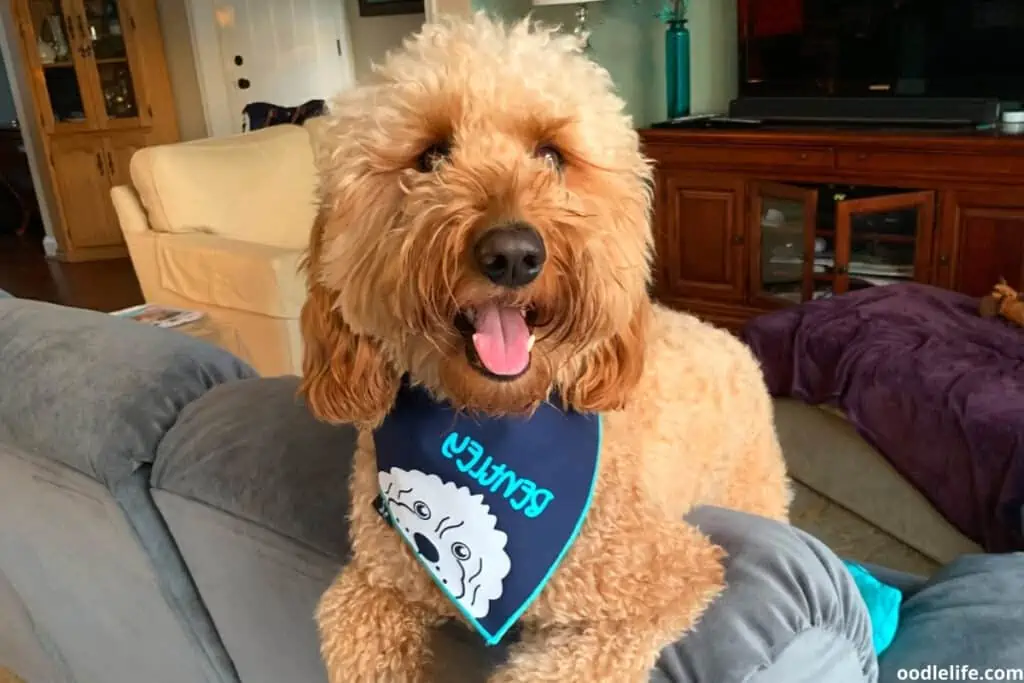
3. Play and Exercise Before Leaving
We mentioned above that your Goldendoodle might have increased anxiety when you leave because you haven’t given them proper play or exercise time. Providing both mental and physical stimulation can tire your pup out before you leave so he can stay calm.
Plan for 15 to 20 minutes of playtime with your Doodle before you go to work, run errands, or go out with friends for the night. Work on new and exciting tricks that will work out your pup’s brain or take him for a long walk.

4. Provide Distracting Toys
Some dogs can better manage their anxiety if they have something to distract them in the first several minutes you’re away. For example, interactive toys or time-consuming treats can keep your pup busy and happy; by the time they’re finished, they hardly remember that you left.
Consider filling a toy with peanut butter or loading a game with hidden treats when you’re getting ready to leave for the day.
Remember that you should only use this option for dogs with mild separation anxiety. These dogs will learn to love the routine. Dogs with more serious issues may begin to associate toys and treats with you leaving, increasing their panic.
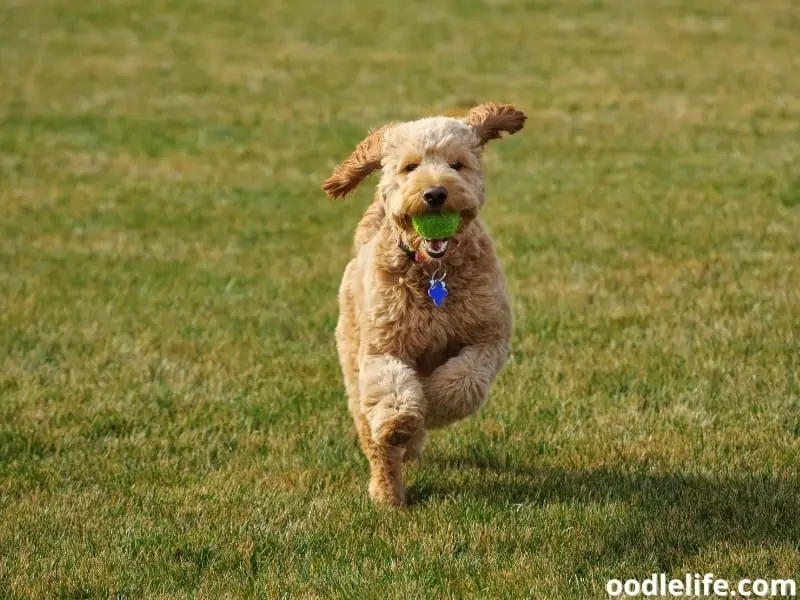
5. Get a Second Dog
Dogs are pack animals, so many feel comfortable around other dogs. If your dog feels lonely at home while you’re gone, it might benefit from a companion.
Everyone can’t own more than one pet, but if you can pull it off, it’s a great way to manage separation anxiety. A companion pet can help keep your pooch company while you’re away, giving them a friend to hang out and play with.
If you have a second dog or even a cat, your dog will never be alone.
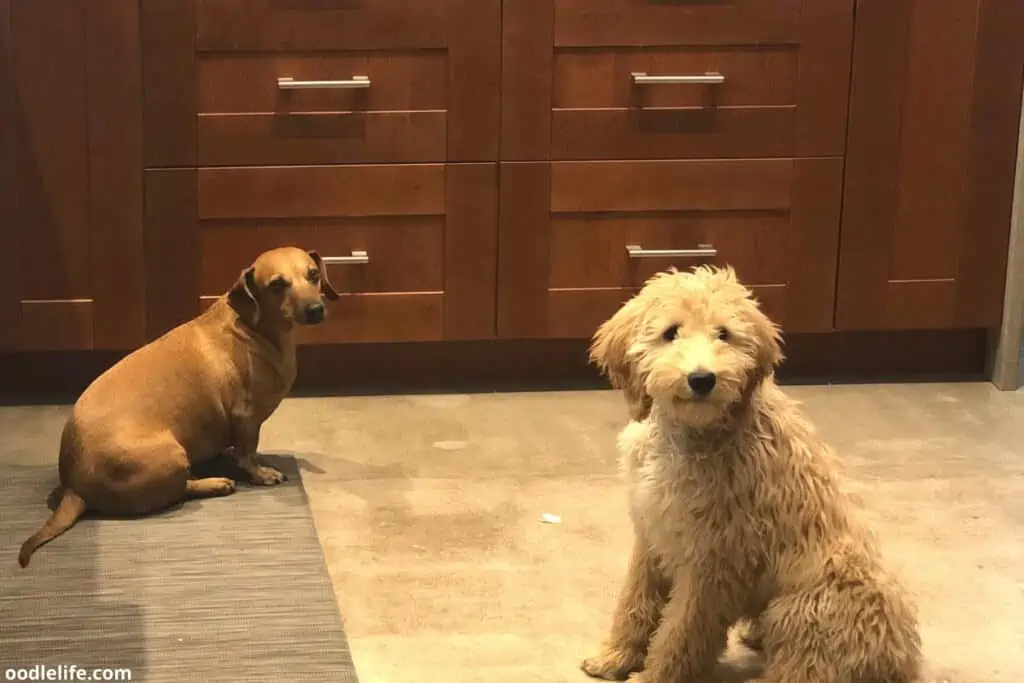
6. Talk to Your Vet About Medication
In severe cases, dogs with significant separation anxiety can benefit from the use of prescription medication. Medication may be the solution when your dog is hurting itself, harming another animal in the house, or has lost quality of life due to anxiety.
There are two main types of anxiety medications for dogs. One is a regular medication taken daily for long-term use. The other is for specific events that are known to trigger anxiety.
Anti-anxiety medications can help calm your dog enough to allow you to continue training to reduce anxiety. When used correctly, it’s possible to wean your dog off the medication and facilitate learning that will lead to a better lifestyle.
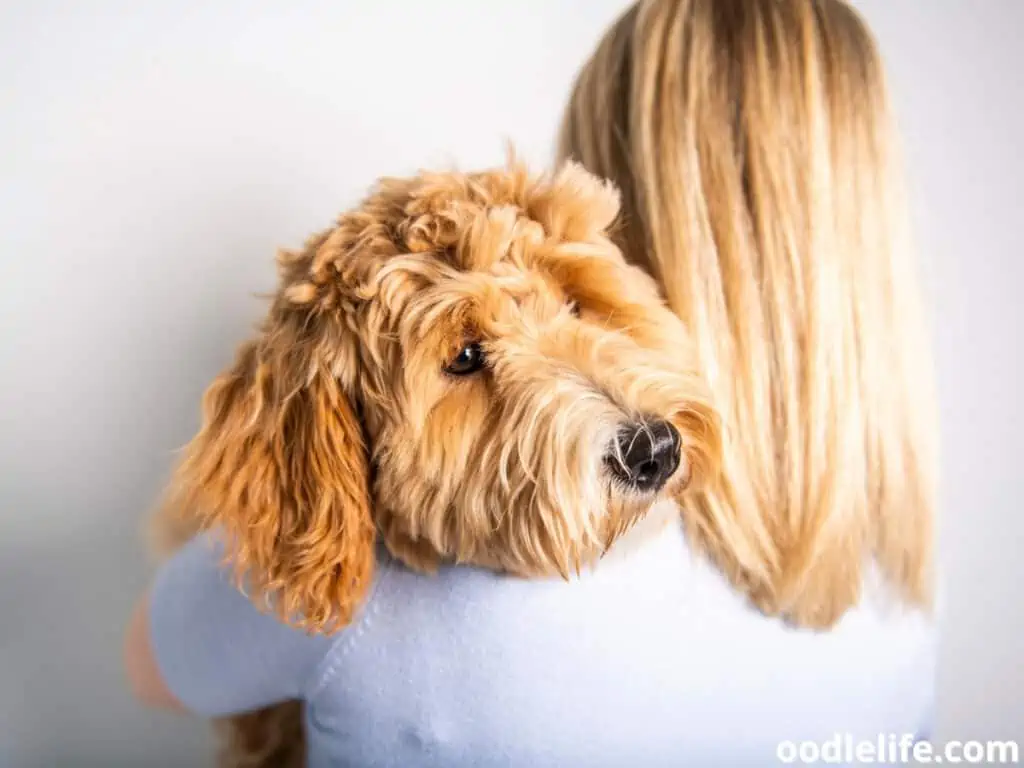
FAQs
If you still have questions about Goldendoodle separation anxiety, keep reading below to see our frequently asked questions.

Do all Goldendoodles get separation anxiety?
Not every Goldendoodle will have separation anxiety. Although the breed is prone to this condition due to its friendly, social nature, you can avoid separation anxiety through proper training, exercise, and routines.
Does CBD oil work for dogs?
CBD oil can be very helpful for dogs with anxiety. CBD oil provides excellent stress relief due to its calming effects. This natural remedy is safe for dogs, too.
What are thunder jackets?
Thunder jackets are weighted vests for dogs that provide gentle compression to help reduce anxiety. The compression encourages the release of endorphins, which are calming chemicals. Thunder jackets’ effectiveness varies widely from dog to dog.
Final Thoughts
Goldendoodles are adorable, lively, and adoring dogs. They love to play and socialize and are incredibly loyal to their owners.
But your Goldendoodle may love you so much that he desperately misses you when you’re gone. Don’t fret—there are plenty of ways to help Goldendoodle separation anxiety. Use these tips, and remember to always talk to your vet about any major concerns you have.